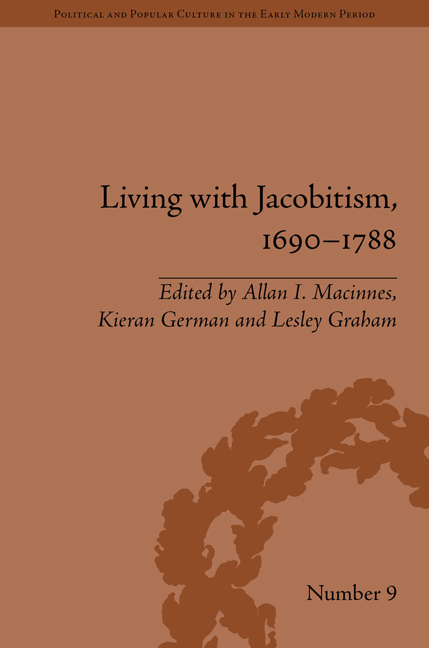Book contents
- Frontmatter
- CONTENTS
- List of Contributors
- List of Figures
- Abbreviations
- Preface: Breandán Ó Buachalla, A Tribute
- Introduction: Living with Jacobitism
- 1 The First Jacobite and the Scottish Parliament
- 2 The Scottish Jacobite Community at Saint-Germain after the Departure of the Stuart Court
- 3 Liturgy: The Sacramental Soul of Jacobitism
- 4 ‘Zealous in the Defence of the Protestant Religion and Liberty’: The Making of Whig Scotland, c. 1688–c. 1746
- 5 Jonathan Swift's Memoirs of a Jacobite
- 6 ‘Female Rebels’: The Female Figure in Anti-Jacobite Propaganda
- 7 Commerce and the Jacobite Court: Scottish Migrants in France,1688–1718
- 8 Ultramontane Ultras: The Intellectual Character of Irish Students at the University of Paris
- 9 To a Fair Meeting on the Green: The Order of Toboso and Jacobite Fraternalism, 1726–c. 1739
- 10 English and Scottish Jacobite Painters in Eighteenth-Century Rome
- 11 Polite War: Material Culture of the Jacobite Era, 1688–1760
- 12 Robert Adam: ‘My Mother's Dear British Boy’
- 13 From Jacobite to Jacobin: Robert Watson's Life in Opposition
- 14 Robert Louis Stevenson's ‘The Young Chevalier’: Unimagined Space
- Notes
- Index
Preface: Breandán Ó Buachalla, A Tribute
- Frontmatter
- CONTENTS
- List of Contributors
- List of Figures
- Abbreviations
- Preface: Breandán Ó Buachalla, A Tribute
- Introduction: Living with Jacobitism
- 1 The First Jacobite and the Scottish Parliament
- 2 The Scottish Jacobite Community at Saint-Germain after the Departure of the Stuart Court
- 3 Liturgy: The Sacramental Soul of Jacobitism
- 4 ‘Zealous in the Defence of the Protestant Religion and Liberty’: The Making of Whig Scotland, c. 1688–c. 1746
- 5 Jonathan Swift's Memoirs of a Jacobite
- 6 ‘Female Rebels’: The Female Figure in Anti-Jacobite Propaganda
- 7 Commerce and the Jacobite Court: Scottish Migrants in France,1688–1718
- 8 Ultramontane Ultras: The Intellectual Character of Irish Students at the University of Paris
- 9 To a Fair Meeting on the Green: The Order of Toboso and Jacobite Fraternalism, 1726–c. 1739
- 10 English and Scottish Jacobite Painters in Eighteenth-Century Rome
- 11 Polite War: Material Culture of the Jacobite Era, 1688–1760
- 12 Robert Adam: ‘My Mother's Dear British Boy’
- 13 From Jacobite to Jacobin: Robert Watson's Life in Opposition
- 14 Robert Louis Stevenson's ‘The Young Chevalier’: Unimagined Space
- Notes
- Index
Summary
Aodh Mhac Curtán, an crann os coill,
Ailgmheasach Mumhan ‘nois chanaim,
An file faobhrach [i] bhfriotal Fáil,
Feas a bhreath [i] measc na mórdhail.
Thus wrote the Irish poet Tadhg Ó Neachtain of Aodh Buí Mac Cruitín, a leading evangelist of a literary tradition which Breandán Ó Buachalla made his own over a fifty-year academic career. The metaphor is appropriate because Ó Buachalla towered like an enormous oak over Irish studies. Tháinig Breandán ar an tsaoil i gCorcaigh ar 15 Eanáir 1936, an cathairina bhfuair sé a bhunoideachas agus a mheánoideachas. Bronnadh BA agus MA sa Léann Ceilteach air (1957–8) ó Choláiste na hOllscoile, Corcaigh. Chaith sé seal mar léachtóir le Gaeilge i mBéal Feirste, áit inár chuir sé spéis in oidhreacht liteartha Chúige Uladh san 18ú haois. Over the next decade he catalogued Irish manuscripts in Belfast Public Library (1962), edited the poems and songs of Peadar Ó Doirnín (1969) and Cathal Buí Mac Giolla Gunna (1969) and wrote his paradigmshifting monograph I mBéal Feirste cois cuain (1968), which showed how the Presbyterians of late eighteenth-century Belfast had rescued the Irish language.
As well as immersing himself in the literary heritage of south Ulster, he regularly traversed a region blighted by partition. In an illuminating, early 1990s interview in Urney Cemetery, which nestled under the British army barracks that dominated Sliabhg Cuilinn, Ó Buachalla spoke of a living literary tradition which could be traced back through the poets of south Ulster to Cúchulainn.
- Type
- Chapter
- Information
- Living with Jacobitism, 1690–1788The Three Kingdoms and Beyond, pp. xiii - xviPublisher: Pickering & ChattoFirst published in: 2014

